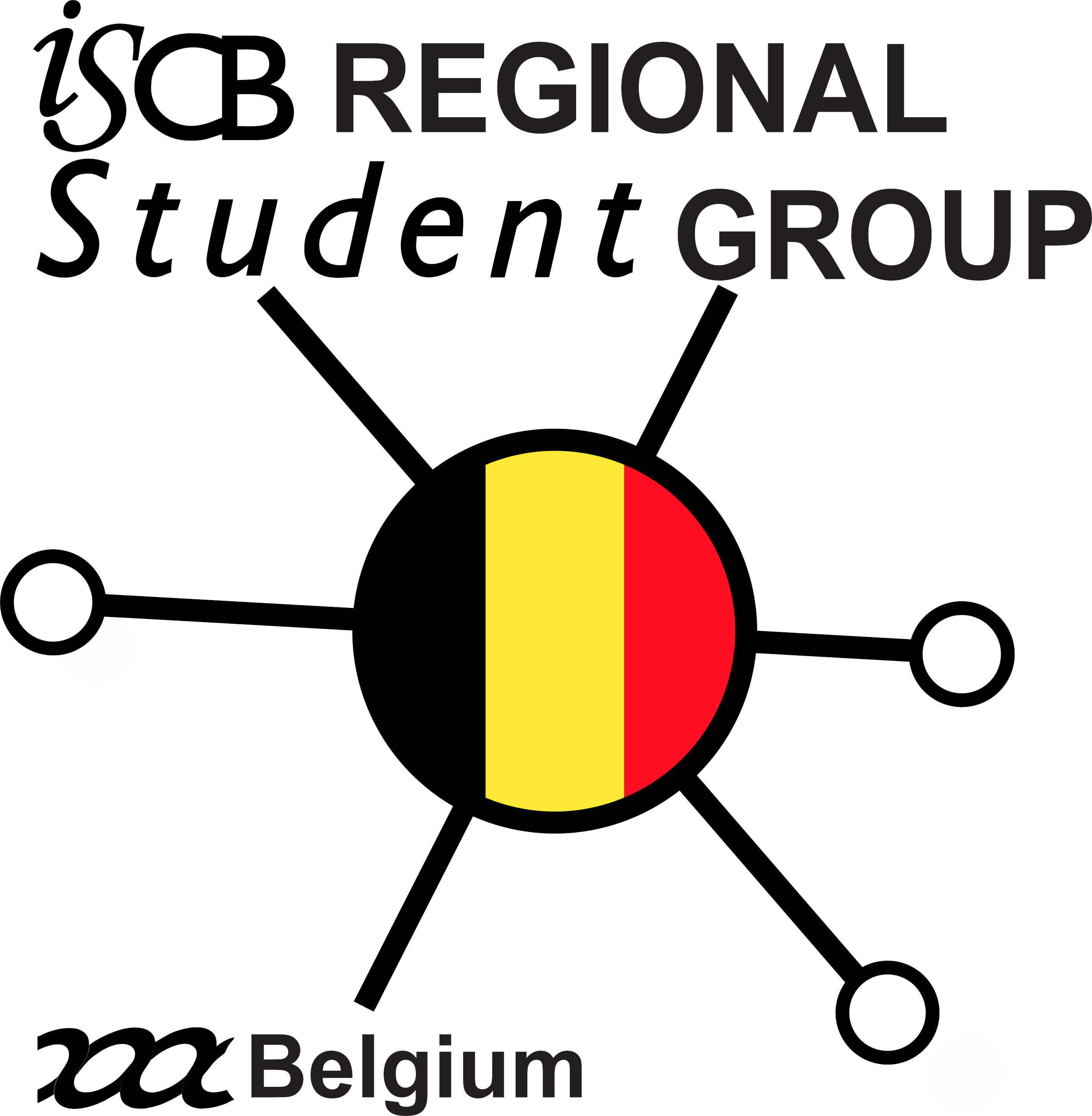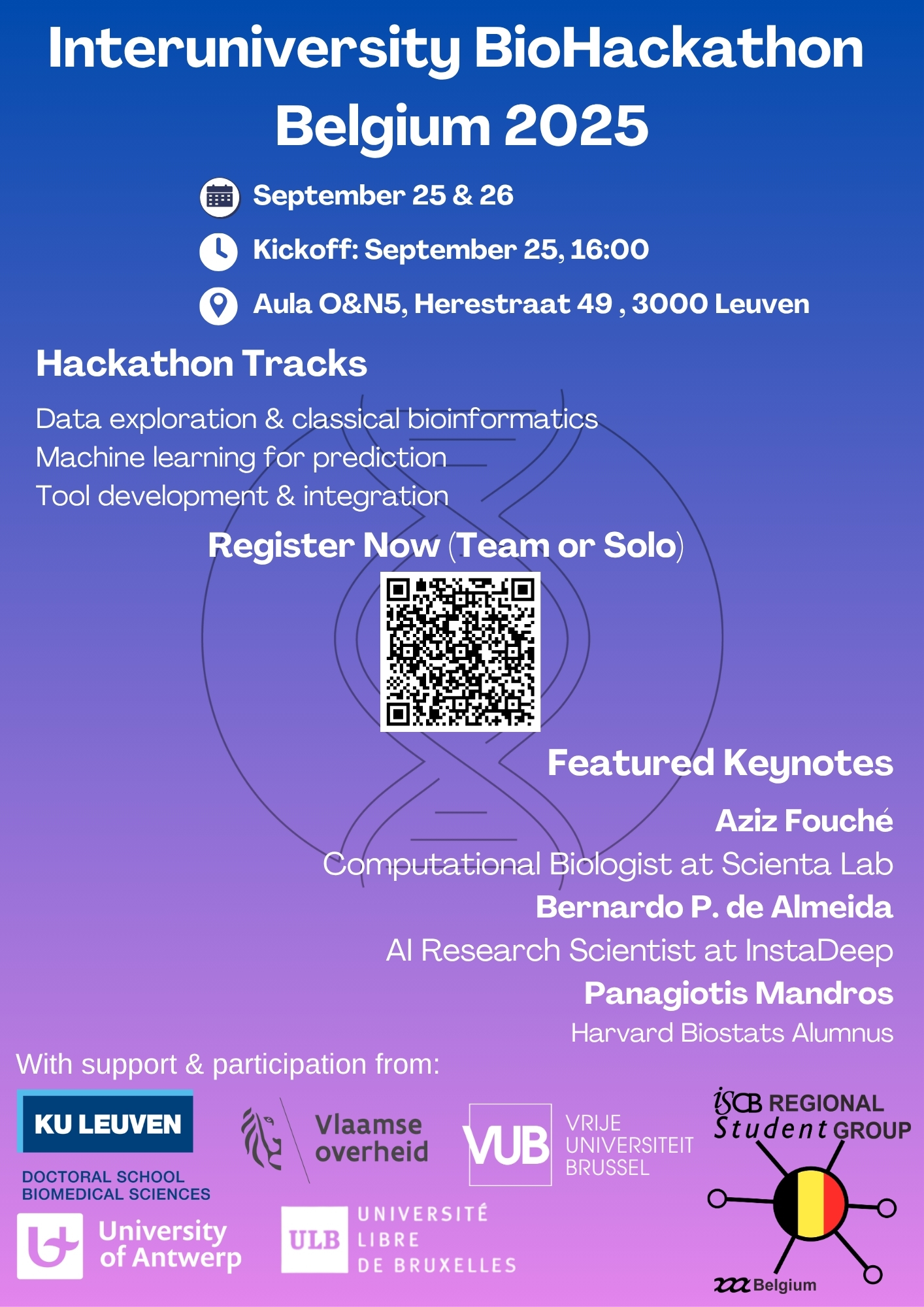Announcing the Interuniversity Biohackathon Belgium 2025


We are proud to announce the Interuniversity Bioinformatics Hackathon, taking place this September 2025. This event is a collaborative initiative between KU Leuven, VUB, UAntwerpen, and the Regional Student Group of the International Society for Computational Biology (ISCB) in Belgium.
This hackathon will unite top researchers, Msc and PhD students, postdocs, and AI/bioinformatics professionals to address real-world challenges at the intersection of artificial intelligence and bioinformatics.
We will kick off this edition of the biohackathon with three keynotes from esteemed speakers from Harvard Biostats, InstaDeep and Scienta Lab, described below.
We have designed three different tracks to choose from, which are described below. The full details of each track will be revealed on the day of the biohackathon.
We ask you however to already indicate your preference during registration. This is not binding, but it gives us a way to gauge interest.
Do not hesitate, register now!
Where and when?
- Registration deadline: September 18, 2025
- Date and time:
- Day 1: September 25, 2025, from 15:00 till 20:00
Place: Aula O&N5, Onderwijs en Navorsing 5, Herestraat 49, 3000 Leuven
- Day 2: September 26, 2025, from 8:00 till 20:00
Place: Zaal Couvreur, Leercentrum AGORA, Edward Van Evenstraat 4, 3000 Leuven
More information on how to get there is provided below.
Program Overview
Day 1
| Time | Activity |
|---|---|
| 15:00 | Reception begins |
| 16:00 | Opening session |
| 17:00 | Exploratory and Confirmatory Data Analysis in Biology and Healthcare, Panagiotis Mandros From PCA to scGPT: exploring the high dimensional geometries of single-cell RNA-seq data , Aziz Fouché, Scienta Lab Foundational models for genomics, Bernardo De Pereira Almeida, InstaDeep |
| 19:30 | Track reveal |
| 20:30 | Hackathon starts |
Day 2
| Time | Activity |
|---|---|
| 08:00 | Doors open - Hacking session resumes |
| 12:30 | Lunch |
| 15:00 | Coffee break |
| 17:00 | Pitch submission deadline |
| 17:00–19:00 | Final project pitches + jury feedback |
| 19:00–20:00 | Awards & closing ceremony |
About the Workshops
Exploratory and Confirmatory Data Analysis in Biology and Healthcare
This talk will explore the complementary roles of exploratory and confirmatory analysis in biology and health research, with a central focus on differential analysis. From traditional differential analysis on tabular data to more complex applications such as gene regulatory network inference and analysis, I will discuss how analytical approaches must be tailored to the specific goals and data characteristics of each application. By understanding these needs—whether generating new hypotheses, validating biological mechanisms, or supporting clinical decisions—we can better integrate exploratory and confirmatory methods to enhance both discovery and rigor in computational biology and health sciences.
About the speaker: Panagiotis Mandros is a computer scientist developing theory and algorithms for applications in scientific discovery. He earned his PhD from Saarland University and the Max Planck Institute for Informatics, where he focused on the algorithmic discovery of non-linear patterns in data. He later joined the Harvard T.H. Chan School of Public Health, where he worked on the inference and analysis of gene regulatory networks to uncover novel disease mechanisms in cancer.
From PCA to scGPT: exploring the high dimensional geometries of single-cell RNA-seq data
Single-cell RNA-seq data provide valuable insights into cellular biology, but their high dimensionality can make analysis difficult. In this workshop, we'll explore practical techniques for learning meaningful latent spaces that make these data easier to interpret and work with, from traditional linear methods to the latest approaches using large pre-trained transformer models.
About the speaker: Aziz Fouché is a computational biologist with a background in computer science and biology from ENS Paris-Saclay and Sorbonne Université. Aziz Fouché completed his Ph.D. at Institut Curie, where he developed methods to analyze the geometry of single-cell transcriptomics data. He now works at Scienta Lab, a Paris-based start-up using large pre-trained models to predict treatment outcomes and identify biomarkers in immunology and inflammation.
Foundational models for genomics
The human genome sequence provides the underlying code for human biology. Understanding the sequence-code of the genome is vital for understanding how genetic variants affect human disease and traits, but it has remained one of the biggest challenges in biology. In an era of exponential growth of genomics and biomedical data, deep learning methods and more specifically foundation models have emerged as powerful tools to aid this goal due to their capacity to identify highly complex patterns in large datasets. Can these models that have revolutionized image recognition and natural language also help us decode the human genome and advance personalized medicine? In this workshop, we will provide an overview of how foundation models can be used to decode the genome, discuss specific models and applications, and get hands-on experience implementing them.
About the speaker: Bernardo Almeida is a Senior Research Scientist at InstaDeep in Paris where he is developing large language foundational models for biology. He received his PhD in 2023 from the University of Vienna after his work on deep learning models to understand the regulatory information encoded in the genome sequence. Earlier, he obtained his undergraduate degree in Biomedical Sciences and masters in Oncobiology from the University of Algarve, Portugal.
Tracks
Data Exploration & Classical Bioinformatics
Analyze a biological dataset to extract meaningful insights or answer a specific biological question. The novelty lies in the clarity of results and the robustness of applied methods. Best for: Participants with backgrounds in bioinformatics, biostatistics, or experimental biology with data analysis experience.
Machine Learning for Prediction
Develop a machine learning model to predict a biological feature or outcome. Emphasis is on justified use of ML, high performance, and model generalizability. Best for: Participants with experience in machine learning, data science, or computational biology.
Tool Development & Integration
Create a bioinformatics tool that enhances pipelines or addresses a research question. Focus on innovation, usability, and practical impact. Best for: Participants with backgrounds in software engineering, tool development, pipeline integration, or bioinformatics.
How to get there?
The university is accessible by bus and train. Specific signs for the hackathon will be available outside the university to guide you.
Please also consult the following map of KU Leuven Gasthuisberg Campus and Leercentrum AGORA to guide you.
Access to Aula O&N5 - Day 1
For more details regarding accessibility, please consult KU Lueven access guide here.
- By Public Transport:
Leuven Station → De Lijn bus 10, R90, R80, 70 → Stop at Heverlee Berg Tabor or Leuven Gasthuisberg Kliniek - By Car: Park West
Access to Zaal Couvreur - Day 2
For more details regarding accessibility, please consult KU Lueven access guide here.
- By Public Transport:
- Leuven Station → De Lijn bus 12, 79, 11 → Stop at Parkpoort
- or De Lijn bus 4, 14 → Stop at Leuven Rustoord Remy
- or De Lijn bus 2 → Stop at Leuven H. Hartkliniek
- or ~20 min walk
- By Car: Q-Park Leuven Heilig Hart
